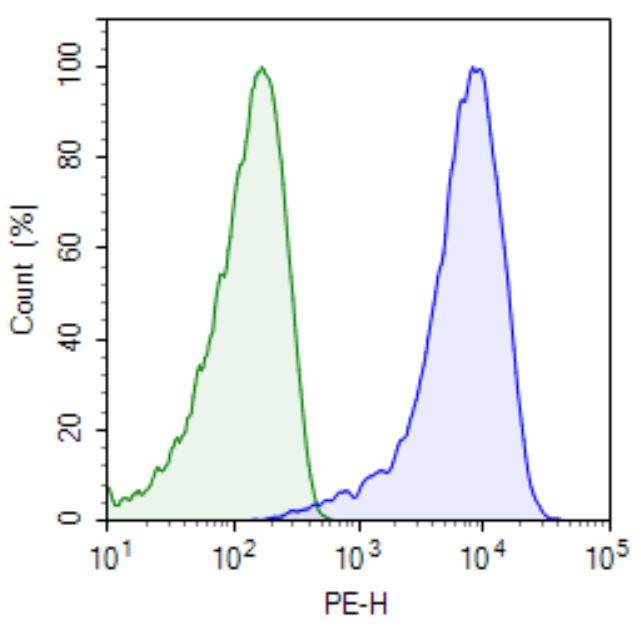CRISPR Services
CRISPR-Cas9 is a technique used for genome editing that is adapted from the bacteria’s antiviral immune response. Bacteria capture and store DNA fragments from invading viruses within a region of their genome, and these CRISPR (Clustered Regularly Interspaced Short Palindromic Repeats) guide sequences help detect and protect the bacteria from future infections. When the CRISPR guide sequences detect an invading virus or DNA whose sequence is complementary to the CRISPR guide, the Cas9 (CRISPR-associated protein 9) nuclease is recruited to specifically cleave the invading DNA, resulting in its degradation.
This CRISPR-Cas9 system has been modified for use in mammalian cells. By introducing a guide sequence (sgRNA) specific for our gene of interest, we can either knock-out specific genes through introducing frame shift mutations via Non-Homologous End Joining (NHEJ), or generate knock-in mutations through additionally providing a template for Homologous Recombination (HR).

With BPS Bioscience’s custom cell line development services, we can generate custom knock-out and knock-in cell lines using CRISPR/Cas9 licensed technology. The development process is comprised of five milestones where data is provided after each milestone completion. Each project is customized for the desired deliverables through working directly with our team of highly trained scientists. Contact us to learn more about these services.
BPS offers over 70 cell types across cancerous and noncancerous cell lines. To create a cell line in a different cell type, contact us.
Knock-In Cell Lines
Knock-Out Cell Lines
• >20 available reporters
• >70 available cell types
CRISPRa
 • CRISPRa (SAM) services are available to activate endogenous expression of your gene of interest
• CRISPRa (SAM) services are available to activate endogenous expression of your gene of interestLentivirus Generated
• Up to 100% transduction of immortalized cells
Knock-Out Cell Lines
![]()
With BPS Bioscience’s custom cell line development services, our team of highly experienced scientists can generate custom knock-out cell lines in more than 70 different cell types using CRISPR-Cas9 licensed technology, targeting whichever gene(s) of interest you’re interested in. The development process is comprised of separate milestones where data is provided after each milestone completion. Each project is customized for the desired deliverables through working directly with you. Contact us to learn more about what we can offer.

1. Molecular Biology
BPS will design and synthesize three short guide RNA (sgRNA) sequences corresponding to your gene of interest to be knocked-out, based on criteria to maximize cutting efficiency while minimizing potential off-targeting. If you are looking to knock-in a point-mutation or add a tag to an endogenously expressed gene, BPS will also design and synthesize the homology driven repair (HDR) template.
 2. CRISPR Transfection
2. CRISPR Transfection
Depending on the cell-type, cells can be transfected via electroporation, liposome-based transfection, or viral infection. The parental cell line can be provided or it will be supplied by BPS.
 3. Limiting Dilution
3. Limiting Dilution
Based upon the results of the initial pool testing, the cell pool will be clonally diluted and the single cell-derived clones will be expanded.
4. Screen For Either Loss of Expression or the Knock-In Mutation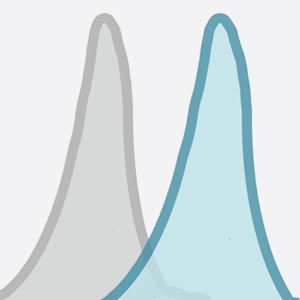
The expression level of the gene of interest will be analyzed via Western Blot or FACS.
 5. Confirmation
5. Confirmation
Genes showing loss of expression of the gene of interest will be further analyzed through genomic sequencing. Furthermore, for Knock-in mutations, functional validation is available depending on the gene of interest. Mycoplasma testing and cell banking services are also available.
CRISPR Knock-In
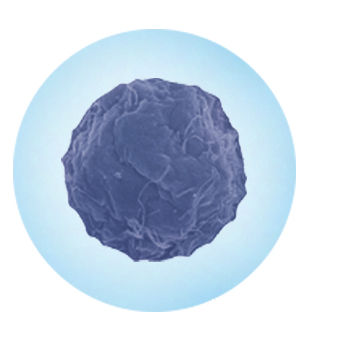
With BPS Bioscience’s custom cell line development services, our team of highly experienced scientists can generate custom knock-in cell lines in more than 70 different cell types using CRISPR-Cas9 licensed technology, targeting whichever gene(s) of interest you’re interested in. The development process is comprised of separate milestones where data is provided after each milestone completion. Each project is customized for the desired deliverables through working directly with you. Contact us to learn more about what we can offer.
 1. Molecular Biology
1. Molecular BiologyBPS will design and construct the gRNA and HDR template according to your experimental needs.
 2. Stable Cell Line Generation
2. Stable Cell Line GenerationThe cells will be transduced with the Cas9, gRNA, and HDR template, followed by genome editing evaluation. Single clones will be selected and expanded.
 3. Genotyping & Confirmation
3. Genotyping & ConfirmationThe knock-in mutations will be confirmed by genomic sequencing, and positive clones will be expanded for further confirmation.
CRISPR Activation

Induce transcriptional activation and expression of any gene of interest
Induction can be more than a hundred-fold, depending on the gene
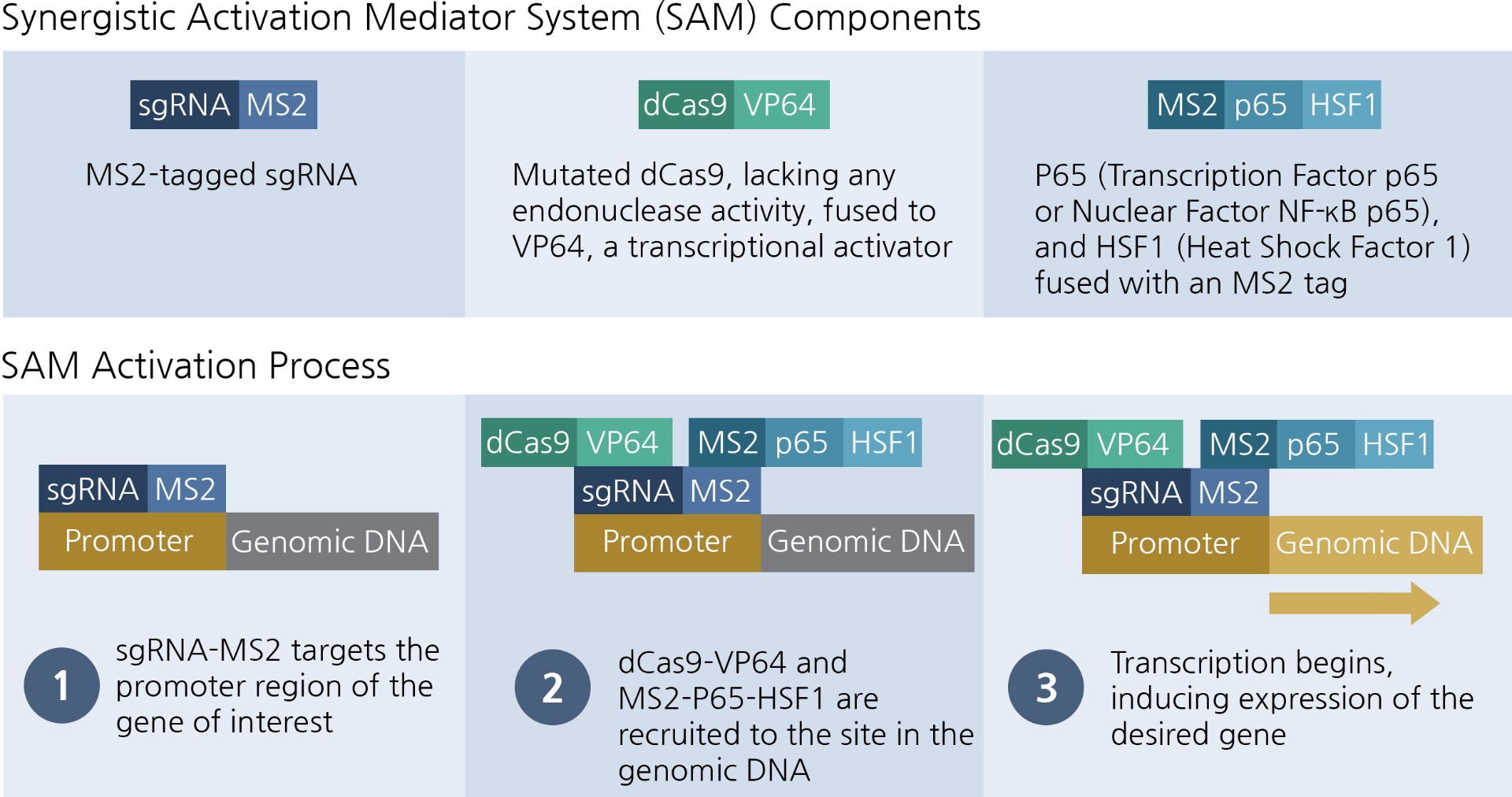
The CRISPR Synergistic Activation Mediator (SAM) system is used to induce transcriptional activation and expression of any gene of interest. The SAM system consists of 3 components: (1) a mutated dCas9 (Streptococcus pyogenes CRISPR associated protein 9), lacking any endonuclease activity, fused to VP64, a transcriptional activator; (2) P65 (Transcription Factor p65, or Nuclear Factor NF-κ-B p65) and HSF1 (Heat Shock Factor 1) fused with an MS2 tag; and (3) the MS2-tagged sgRNA targeting the promoter region of the gene of interest.
Once the sgRNA-MS2 targets the promoter region of the gene of interest, dCas9-VP64 and MS2-P65-HSF1 are recruited to the site in the genomic DNA and begin transcription, inducing expression of the desired gene. Induction can be more than a hundred-fold, depending on the gene.
With BPS Bioscience’s custom cell line development services, our team of highly experienced scientists can generate custom CRISPR activation cell lines in more than 70 different cell types using CRISPR-Cas9 licensed technology, targeting whichever gene(s) of interest you’re interested in. The development process is comprised of separate milestones where data is provided after each milestone completion. Each project is customized for the desired deliverables through working directly with you. Contact us to learn more about what we can offer.
Lentivirus Generated CRISPR Cell Lines
The CRISPR Lentiviruses are replication incompetent, HIV-based VSV-G pseudotyped lentiviral particles that are ready to be transduced into almost all types of mammalian cells, including primary and non-dividing cells. These particles contain a CRISPR/Cas9 gene driven by an EF1a promoter, along with 4 validated sgRNA (single guide RNA) targeting your gene of interest, driven by a U6 promoter.
Conduct your research directly with a BPS lentivirus product, or choose to utilize our custom services to develop a cell line designed to meet your research needs. Our CRISPR experts will provide project guidance in addition to your custom lentivirus-generated knock-out cell line.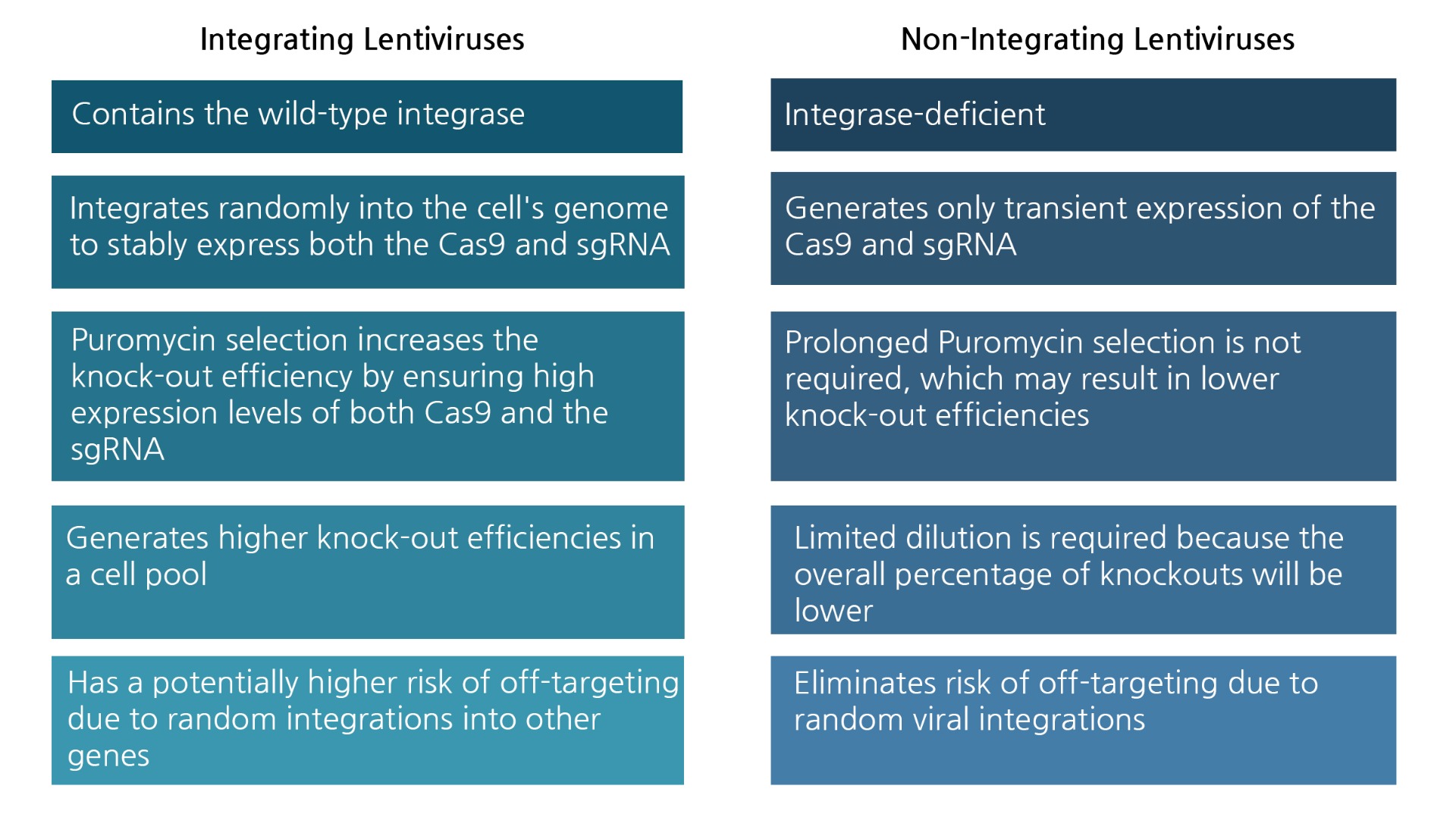
For more information about our CRISPR services and capabilities, please contact us.
Quote Request
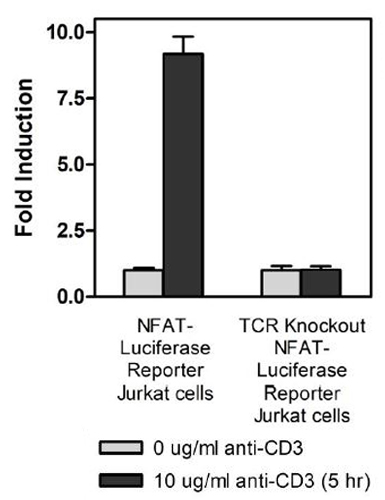
Parental NFAT-Luciferase Jurkat cells or TRAC/TRBC1 KO NFAT-Luciferase Jurkat cells were plated in triplicate at 25,000 cells/well into a clear-bottom 96-well plate. Cells were then incubated with either 0 or 10 ug/ml anti-CD3 for 5 hours at 37°C. After incubation, ONE-Step Luciferase reagent (BPS Bioscience, #60690) was added to the cells to measure NFAT activity.
FACS Analysis of TCRα/β Expression in TCR Knockout NFAT Luciferase Reporter Jurkat Cells
FACS analysis was performed using a PE-labeled anti-human TCRα/β antibody from BioLegend (#306707). Parental NFAT-Luciferase Jurkat cells are shown in blue, the TCR Knockout NFAT-Luciferase Reporter Jurkat cells in green







